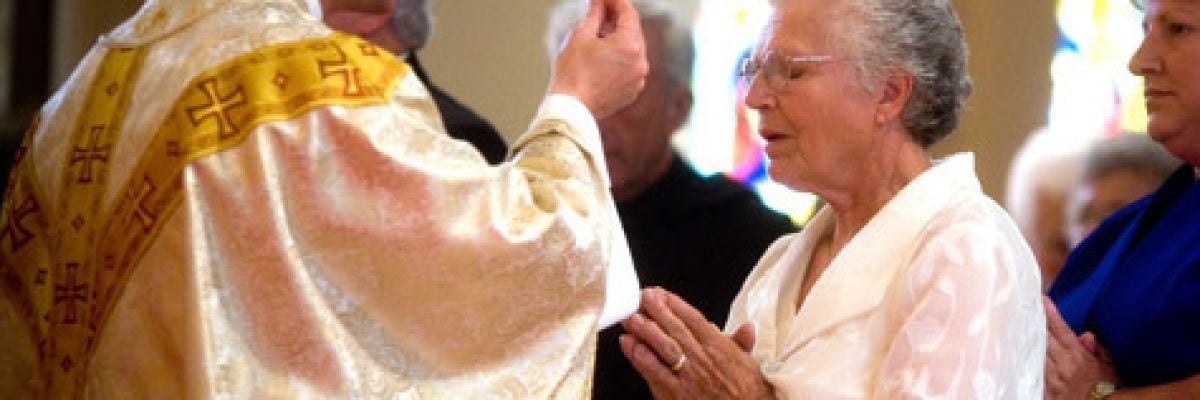
I was never fed in the Catholic Church.
How many times have you heard a former Catholic say this? When I was an Evangelical Christian it was probably the most common response I heard from Catholics when asked why they had left the Church. The sad truth is that most of these lapsed Catholics were never properly catechized, so they became easy targets for Protestants who were only too eager to help them abandon the sacraments and join a church that “feeds you God’s Word, the Bible.”
These Catholics had absolutely no idea that the Eucharist they had been receiving for years was truly the body and blood, soul and divinity, of our Lord Jesus Christ. They had no idea that the “real meat for the soul” was not good preaching, or praise and worship, but Jesus Christ in the Eucharist, the true “bread of life.” Because if they had truly understood and believed the Church’s teaching on the Eucharist, that it’s not a symbol, but is Christ himself—body, blood, soul, and divinity, under the appearance of bread and wine—they would not had become such easy pickings for Protestant evangelists, or for the secular world for that matter. Who could leave the Church knowing that this precious Bread of Life that we receive at each Mass nourishes us with the love that redeems us, Jesus Christ himself? I say it would be impossible!
That was in the1970s. Fast forward to 2013. I think it’s safe to say things have not changed too much on the catechetical front. Catholics are still leaving the Church in droves and the average pew Catholics continue to be poorly catechized. For many in the pew, receiving Communion every Sunday is viewed as perfunctory and meaningless. Vatican official Archbishop Nicola Eterovic acknowledges this problem when he says:
The major challenge are the Christians, especially those who were baptized, but not sufficiently catechized.
So, what to do? First, be not afraid! I can’t tell you how many calls and emails I receive from Catholics who are afraid of their own priest. Granted, the priest in question is usually less-than-orthodox, but no matter, he is their shepherd; if approached in a respectful and charitable manner, the intimidation factor will decrease, and he just might hear you. When I asked one recent caller why she was so afraid to approach her priest about a serious liturgical abuse concerning the Eucharist, her answer was simply “I’m afraid he won’t talk to me again.” Some gentle encouragement moved her in the right direction and she ended up speaking with the priest. It may help to remember Psalm 56:11:
In God have I put my trust, I will not be afraid; what can man do unto me?
Another caller was upset when she discovered her son’s Catholic elementary school teacher was discussing homosexual behavior in his history class. Up until that moment, this young boy didn’t know anything about the homosexual lifestyle. This boy went home upset at what he heard. Clearly his innocence had been violated. Since she had already spoken with the teacher about other issues, I recommended she speak with the principal about this last offense. Her answer was, “He knows but he doesn’t see it as a real problem.” I encouraged her to contact a professional who would see it as a real problem and would help her resolve the issue. In that situation, the words of Pope Paul VI come to mind:
It would be useful if every Christian and every evangelizer were to pray about the following thought: men can gain salvation also in other ways, by God’s mercy, even though we do not preach the Gospel to them; but as for us, can we gain salvation if through negligence or fear or shame—what St. Paul called “blushing for the Gospel”—or as a result of false ideas we fail to preach it?
Second, get involved in your parish. Parishes are places where a person receives instruction on searching for the truth, where faith is nourished and strengthened and where the Christian message and God’s plan for humanity and the world is communicated. Look for ways to strengthen catechesis in the parish. Involvement in RCIA or CCD can do so much good. Many RCIA programs churn out poorly catechized Catholics, who, after they’re received into the Church or confirmed, they still see no evidence or insufficient evidence for the Catholic faith. Nor do they have a clear understanding about what is happening on the altar at Mass when the words of consecration are pronounced. It’s not long before receiving Holy Communion every Sunday is viewed as perfunctory and meaningless. The next step is out the door, unlikely to return.
John’s Gospel famously begins:
In the beginning was the Word, and the Word was with God, and the Word was God (John 1:).
If anyone tells you that he was never fed with the Word of God when he was Catholic, show him this verse and gently explain that he was fed as a Catholic—with Scripture, yes, but first and foremost with Christ himself, the Word of God incarnate, in the Eucharist.


